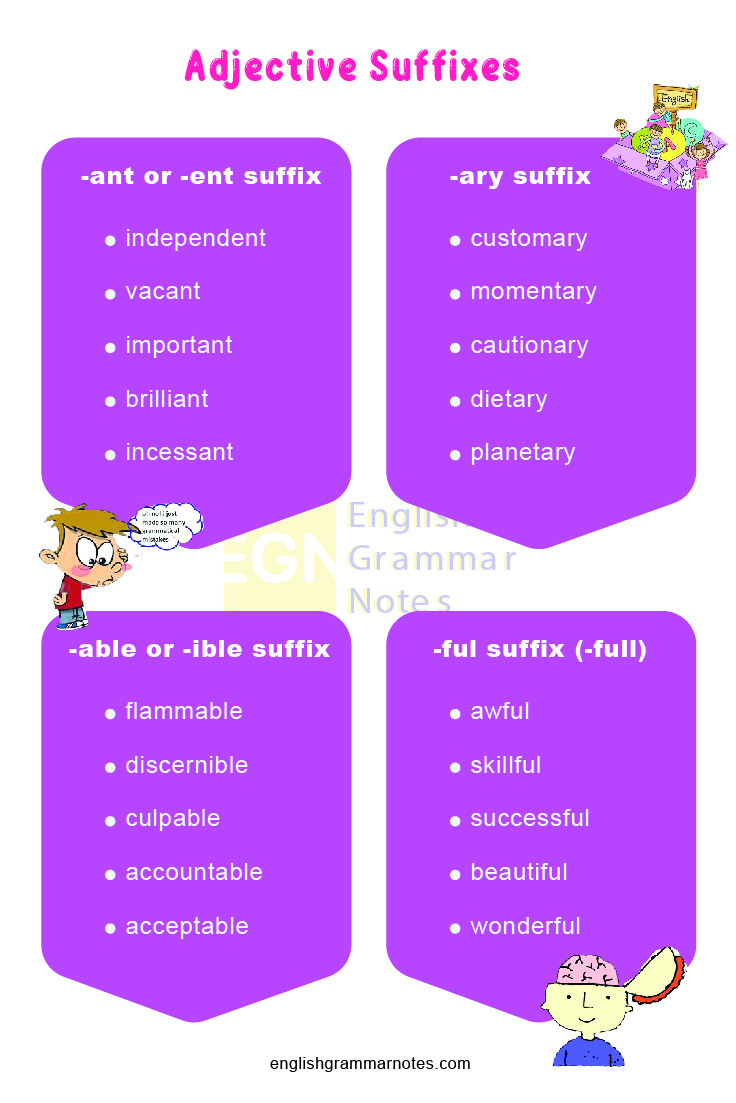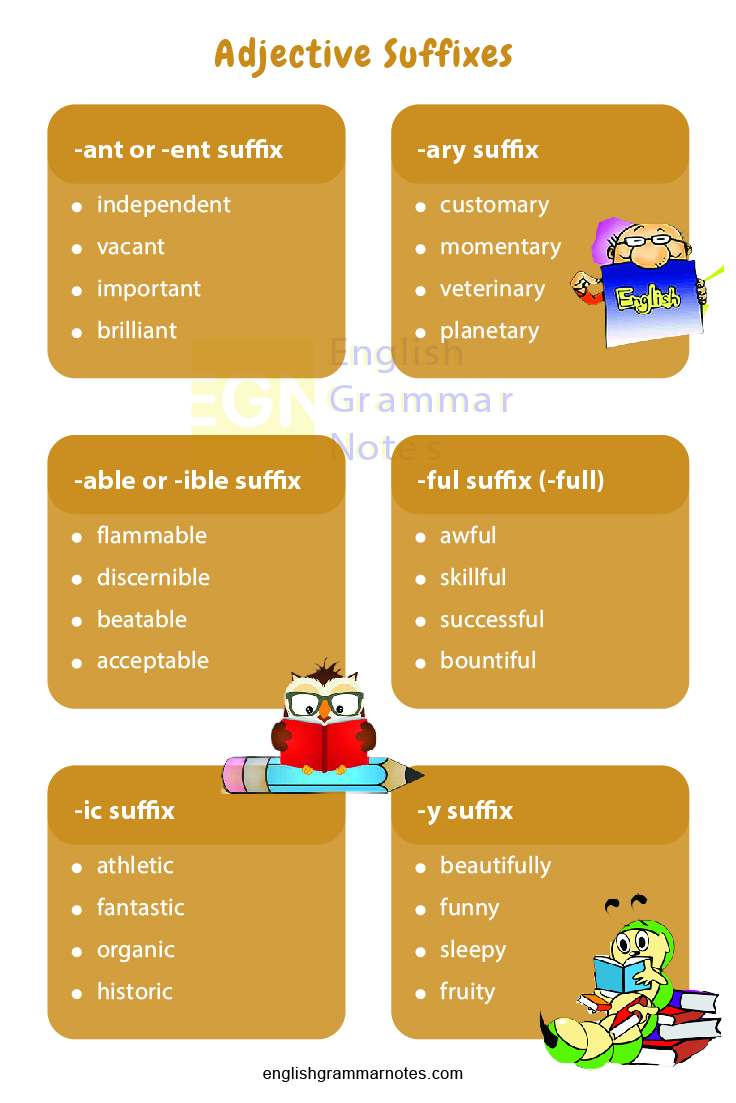Letters positioned at the end of a word are known as suffixes. These endings can convert the class of a word. For example, adding a particular suffix to a word can change it from a noun to an adjective. Such a group of endings is called adjective suffixes. They turn words into adjectives.
An adjective is something that describes a noun. You can add adjective suffixes to verbs and nouns to create an adjective. Therefore, adjective suffixes change the root word’s grammatical function. For instance, adding -able to the verb cure produces a new adjective that is curable.
The new adjective created will carry the meaning of the original word, but the meaning will function to describe a noun rather than work as a noun or verb itself.
- Adjective Suffixes List PDF
- Key Points to Remember While Adding an Adjective Suffix
- How to Use an Adjective Suffix?
- What are Adjective Suffixes?
- Which are some of the commonly used adjective suffixes?
- Give examples for the adjective suffix ‘ish’?
Adjective Suffixes List PDF
Given below is a list of some of the commonly used adjective suffixes:
-ant or -ent suffix: Refers to performing or being, inclined towards something/ someone
- independent
- vacant
- important
- brilliant
- incessant
-ary suffix: Relates to something, relating to quality or place
- customary
- momentary
- cautionary
- dietary
- veterinary
- planetary
-able or -ible suffix: (capable of being, capable or worthy of, tending to)
- flammable
- discernible
- culpable
- accountable
- beatable
- acceptable
- edible
-al suffix (-al, -ial, -ical): Means about something, relating to or having the quality of
- accidental
- educational
- brutal
- historical
- regional
- social
- universal
- personal
- experimental
- mental
- universal
-ful suffix (-full): Full of, tending, or liable to
- awful
- skillful
- successful
- bountiful
- beautiful
- wonderful
- careful

-ic suffix: Pertaining or relating to
- athletic
- scenic
- fantastic
- organic
- acidic
- historic
- scenic
-y suffix: Characterized by, tending to
- rainy
- funny
- dirty
- messy
- sleepy
- beautifully
- brainy
- fruity
-like suffix:
- lifelike
- warlike
- childlike
- lifelike
- ladylike
- birdlike
– ish suffix: Origin, nature
- selfish
- sheepish
- pinkish
- bookish
- childish
- boyish
- foolish
– ile suffix: Tending to, capable of
- futile
- gentile
- senile
- fragile
-ive suffix: Performing or tending toward, the nature of
- cooperative
- sensitive
- supportive
- pensive
- creative

-ious or -ous suffix: Full of, relating to, qualities of
- dangerous
- nervous
- gracious
- mysterious
- poisonous
- victorious
-less suffix: Without, lacking, unable to act
- powerless
- friendless
- worthless
- useless
- homeless
- careless
- breathless
- faithless
- fearless
-an, -ian suffix: Refers to one who is or does, related to
- agrarian
- simian
Key Points to Remember While Adding an Adjective Suffix
In certain cases when a suffix gets added to a root word the spelling of the root word transforms. The adjective suffix, ‘-ness’, when combined with words that end with ‘y’ a spelling change occurs. Take the example of the word heavy. Adding the suffix –ness turns the y into i before you get the new word heaviness.
It is necessary to be aware of whether a suffix transforms the spelling of the root word. Learning such common spelling alterations will make sure that you spell a word in the right way.
How to Use an Adjective Suffix?
- Pick a noun or verb to use as the root word. Root word: Home
- Secondly, choose a suffix to attach to the root word Suffix: less.
- Add the suffix to the root to form the adjective. Home+less= Homeless.
Also, See:
FAQs on Adjective Suffixes
1. What are Adjective Suffixes?
An adjective is something that describes a noun. An adjective suffix is added to verbs and nouns to create an adjective. Therefore, adjective suffixes change the root word’s grammatical function. For instance, adding -able to the verb cure produces a new adjective that is curable.
2. Which are some of the commonly used adjective suffixes?
An adjective suffix is added to verbs and nouns to create an adjective. Common adjective suffixes include ious, ish, less, I’ve, etc.
3. Give examples for the adjective suffix ‘ish’?
An adjective is that which describes a noun. An adjective suffix is added to verbs and nouns to create an adjective. Therefore, adjective suffixes change the root word’s grammatical function.’ish’ is a commonly used adjective suffix. Examples include: childish, boyish, girlish, bookish, etc.
Conclusion
Understanding what adjective suffixes are will help you convert nouns and verbs into adjectives. Learning these word-endings will help you distinguish between a noun, adjective, verb, or adverb. Having an idea of adjective suffixes that alter the spellings of words will make sure that you spell them the right way. So make sure to familiarise yourself with the common adjective suffixes. You can even check our other articles on English Vocabulary Words.
